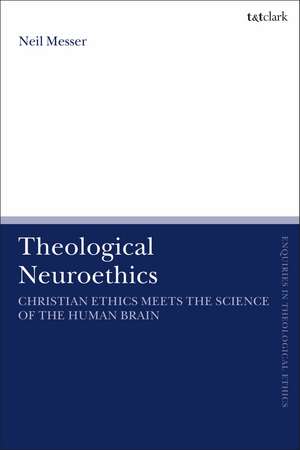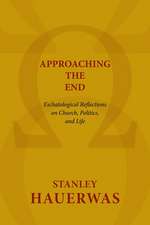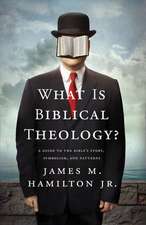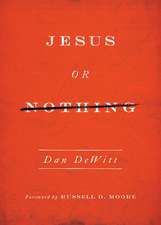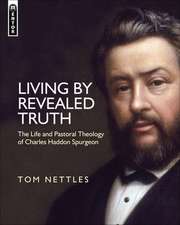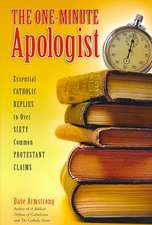Theological Neuroethics: Christian Ethics Meets the Science of the Human Brain: T&T Clark Enquiries in Theological Ethics
Autor Dr Neil Messeren Limba Engleză Paperback – 17 apr 2019
| Toate formatele și edițiile | Preț | Express |
|---|---|---|
| Paperback (1) | 230.33 lei 43-57 zile | |
| Bloomsbury Publishing – 17 apr 2019 | 230.33 lei 43-57 zile | |
| Hardback (1) | 715.73 lei 43-57 zile | |
| Bloomsbury Publishing – 18 oct 2017 | 715.73 lei 43-57 zile |
Din seria T&T Clark Enquiries in Theological Ethics
- 23%
 Preț: 192.01 lei
Preț: 192.01 lei - 30%
 Preț: 510.42 lei
Preț: 510.42 lei -
 Preț: 159.53 lei
Preț: 159.53 lei - 23%
 Preț: 193.45 lei
Preț: 193.45 lei - 30%
 Preț: 510.04 lei
Preț: 510.04 lei - 23%
 Preț: 196.96 lei
Preț: 196.96 lei - 23%
 Preț: 198.93 lei
Preț: 198.93 lei - 23%
 Preț: 192.19 lei
Preț: 192.19 lei - 23%
 Preț: 190.68 lei
Preț: 190.68 lei - 30%
 Preț: 511.40 lei
Preț: 511.40 lei - 30%
 Preț: 511.40 lei
Preț: 511.40 lei - 22%
 Preț: 224.66 lei
Preț: 224.66 lei - 23%
 Preț: 191.92 lei
Preț: 191.92 lei - 30%
 Preț: 511.72 lei
Preț: 511.72 lei - 23%
 Preț: 222.93 lei
Preț: 222.93 lei - 22%
 Preț: 230.43 lei
Preț: 230.43 lei - 14%
 Preț: 542.02 lei
Preț: 542.02 lei - 22%
 Preț: 237.10 lei
Preț: 237.10 lei - 21%
 Preț: 215.88 lei
Preț: 215.88 lei - 23%
 Preț: 191.22 lei
Preț: 191.22 lei - 22%
 Preț: 231.63 lei
Preț: 231.63 lei - 28%
 Preț: 466.05 lei
Preț: 466.05 lei - 22%
 Preț: 240.68 lei
Preț: 240.68 lei - 30%
 Preț: 539.42 lei
Preț: 539.42 lei - 24%
 Preț: 196.54 lei
Preț: 196.54 lei - 30%
 Preț: 597.87 lei
Preț: 597.87 lei - 30%
 Preț: 510.99 lei
Preț: 510.99 lei - 22%
 Preț: 231.89 lei
Preț: 231.89 lei - 21%
 Preț: 218.09 lei
Preț: 218.09 lei
Preț: 230.33 lei
Preț vechi: 264.81 lei
-13% Nou
Puncte Express: 345
Preț estimativ în valută:
44.07€ • 46.13$ • 36.68£
44.07€ • 46.13$ • 36.68£
Carte tipărită la comandă
Livrare economică 31 martie-14 aprilie
Preluare comenzi: 021 569.72.76
Specificații
ISBN-13: 9780567688019
ISBN-10: 0567688011
Pagini: 224
Dimensiuni: 156 x 234 x 16 mm
Greutate: 0.32 kg
Editura: Bloomsbury Publishing
Colecția T&T Clark
Seria T&T Clark Enquiries in Theological Ethics
Locul publicării:London, United Kingdom
ISBN-10: 0567688011
Pagini: 224
Dimensiuni: 156 x 234 x 16 mm
Greutate: 0.32 kg
Editura: Bloomsbury Publishing
Colecția T&T Clark
Seria T&T Clark Enquiries in Theological Ethics
Locul publicării:London, United Kingdom
Caracteristici
It draws on both theological ethics and the science-theology dialogue to address ethical questions raised by a fast-moving area of scientific research
Notă biografică
Neil Messer is Professor of Theology at the University of Winchester, UK.
Cuprins
Chapter 1: Introduction: Where Science, Theology and Ethics Collide?Chapter 2Pious Primates with Believing Brains: Evolutionary, Cognitive and Neuroscientific Accounts of ReligionChapter 3Selves, Souls and Consciousness: Uncle Charlie Revisited Chapter 3Neuroscience, Moral Judgement and the Theological Suspicion of EthicsChapter 4'Like God, Knowing Good and Evil' The Neuroscience of Morality and the theological suspicion of ethics Chapter 5Freedom, Responsibility, Sin and Grace: 'Mr Puppet' meets St AugustineChapter 6Messing with Our Minds: The Ethics of Technological Interventions in the BrainChapter 7Conclusion: Collision or Creative Meeting?BibliographyIndex
Recenzii
This volume is a great initial exposure to some of the issues involved in ethics, neuroscience, and what a theological response could be ... recommended for upper-division university students in philosophy or theology and graduate students in those disciplines.
By demonstrating ways that a theologian can bring rigorous, informed scholarship into meaningful discussion with neuroscientific research, Messer has opened the door for other theological perspectives. Messer's in-depth interdisciplinary dialogue is a summons to theologians to engage with neuroethics and to push the dialogue into areas beyond those discussed in his book.
Messer's excellent and approachable text does a comprehensive, thoughtful, and well-informed job of addressing a prominent and problematic gap: the absence of dialogue between theology and neuroethics. It could serve as an effective university text and would be engaging for anyone interested in bioethicists and neuroscience in general.
This book is a timely and much needed volume in neuroethics, where theological voices are mostly absent. Messer convincingly demonstrates how a theological exploration of neuroethical issues can benefit not only theology in its engagement with neuroscientific knowledge, but also neuroscience in the broadening of its epistemic horizons [.] He provides extensive analysis of current key issues arising in neuroscience and neurology, and offers a theological examination that could surprise many, especially those who might be skeptical about the contribution of theology to neuroethics. Those interested in neuroethics beyond the limited scope of its contemporary version will find this volume eye opening and unique in its merging of theology and brain science. Messer truly creates a path for Christian theology to meet the science of the human brain.
Neil Messer demonstrates that the meeting of neuroscience, theology and ethics has potential to be a creative encounter rather than a destructive collision. He engages in a pioneering exploration of territory which few theologians have previously visited, and he invites neuroscientists to visit his own theological territory in return. He shows us that theology has a contribution to make to thinking about neuroethics; for example, drawing on the parable of the Good Samaritan in illuminating our understanding of how to care for people with brain damage, and Augustine in shedding light on the nature of addiction, extending this to a consideration of the "addict in us all". His exploratory forays across disciplinary boundaries, and his offering of hospitality to those from other disciplines, go a long way to deepening mutual understanding between neuroscientists and theologians.
By demonstrating ways that a theologian can bring rigorous, informed scholarship into meaningful discussion with neuroscientific research, Messer has opened the door for other theological perspectives. Messer's in-depth interdisciplinary dialogue is a summons to theologians to engage with neuroethics and to push the dialogue into areas beyond those discussed in his book.
Messer's excellent and approachable text does a comprehensive, thoughtful, and well-informed job of addressing a prominent and problematic gap: the absence of dialogue between theology and neuroethics. It could serve as an effective university text and would be engaging for anyone interested in bioethicists and neuroscience in general.
This book is a timely and much needed volume in neuroethics, where theological voices are mostly absent. Messer convincingly demonstrates how a theological exploration of neuroethical issues can benefit not only theology in its engagement with neuroscientific knowledge, but also neuroscience in the broadening of its epistemic horizons [.] He provides extensive analysis of current key issues arising in neuroscience and neurology, and offers a theological examination that could surprise many, especially those who might be skeptical about the contribution of theology to neuroethics. Those interested in neuroethics beyond the limited scope of its contemporary version will find this volume eye opening and unique in its merging of theology and brain science. Messer truly creates a path for Christian theology to meet the science of the human brain.
Neil Messer demonstrates that the meeting of neuroscience, theology and ethics has potential to be a creative encounter rather than a destructive collision. He engages in a pioneering exploration of territory which few theologians have previously visited, and he invites neuroscientists to visit his own theological territory in return. He shows us that theology has a contribution to make to thinking about neuroethics; for example, drawing on the parable of the Good Samaritan in illuminating our understanding of how to care for people with brain damage, and Augustine in shedding light on the nature of addiction, extending this to a consideration of the "addict in us all". His exploratory forays across disciplinary boundaries, and his offering of hospitality to those from other disciplines, go a long way to deepening mutual understanding between neuroscientists and theologians.
